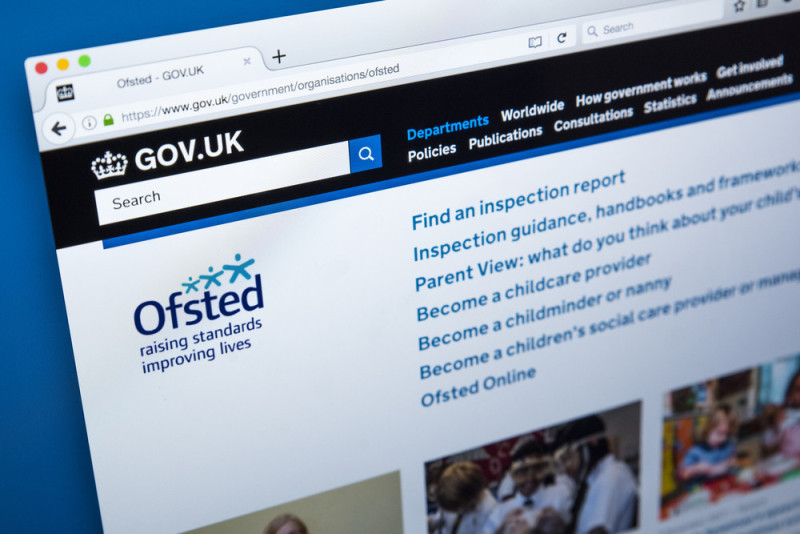In The News
Ofsted’s role in inspecting education settings, long a source of political controversy and bone of contention with teaching staff, has become a topic of national debate following recent, tragic events.
The Labour Party had already proposed scrapping the system of assigning a grade – inadequate, requires improvement, good, outstanding – to a provider. Instead, the party would, if it wins the next election, consult on introducing a report card system that shows what schools, colleges and training providers do well and what they need to improve.
This follows years of complaints and proposals to reform Ofsted from a variety of different education bodies. The Association of School and College Leaders, for example, published a discussion paper in January recommending an end to overall graded judgements. Other changes put forward by the union include telling schools and colleges in which academic year they will be inspected.
The National Education Union has launched a ‘Replace Ofsted – Let Teachers Teach’ campaign, citing evidence that the workload created by accountability was a contributing factor in nearly 40 per cent of teachers leaving the profession within ten years.
Removing ‘outstanding’ providers’ exemption from inspections, which lasted from 2011 to 2020, has also led to nearly two-thirds of grade one schools being pushed down the rankings. That, in addition to the discourse around recent tragic events and what contributors have called a ‘lack of sensitivity’ from Ofsted during the pandemic, has led to resentment towards the watchdog from certain parts of the education sector boiling over.
There have been notable calls to replace Ofsted with a new body. Sam Freedman, a former policy advisor for the education secretary, wrote for the New Statesman that a new independent regulator ought to take over provider regulation from the DfE, or mayors and county equivalents should handle the responsibility.
Writing for The Mark this month, EDSK researcher Eleanor Regan discusses the think tank’s proposal, as outlined in their report No Train No Gain, to hand Ofsted’s responsibility for inspecting apprenticeship provision over to a new National Apprenticeship Inspectorate.
In its defence, Ofsted has shown its willingness to embrace reform. Outgoing chief inspector Amanda Spielman called Labour’s report card plans a “logical evolution” of how school and college performance is communicated. Spielman has also admitted the watchdog’s complaints process is not “satisfying” and Ofsted was looking at adopting a different approach.
It seems almost inevitable that the inspection of education providers will be reformed in some way and there is a plethora of options for how ministers can do that.
Interview
This month, we spoke with Sir Mike Tomlinson, former chief inspector of Ofsted, about how the watchdog's role has expanded over the years and how he thinks its working practices could be updated.

Ofsted's role has expanded over the past few years, to include higher-level apprenticeship provision for example. In your view, what have been the positive results of Ofsted's evolving role?
The major factor has been that now there is a single inspectorate, which is looking at education and training in all settings, starting with childminding, through schools, colleges, and of course into training/apprenticeship work. That ought, in theory, to give a much greater level of consistency in terms of what is inspected and reported upon and judged.
There are those who feel putting all your eggs in one basket is not necessarily a good thing. At one point in my time with Ofsted, that was very much the department’s view. Which is why we at times had separate FE inspectorates, distinct from Ofsted.
What do you make of the criticisms of Ofsted?
There has never been a point in time since Ofsted was created when it was held in universal approval. There is now a general acceptance that providers should be accountable. Also that accountability should be driven by an external body, i.e., Ofsted. And that the results of that accountability exercise should be available to parents of current and future students.
The question now is how should inspection be conducted today? What should it be looking at? How should it report on its findings?
If I were still chief inspector, I'd put out for consultation what I thought it ought to look at. I don't think anyone would disagree with the idea that we should be looking at the quality of teaching and leadership. Those are known through research to be the two key ingredients to a successful provider.
We should also be looking at curriculum and certainly post-16 destinations should be a clear question. After all, if you've spent 11-13 years in education you should be able to exercise several options in terms of where you progress, and those destinations should be known.
I also think that there is a place for student voice. In my experience, there's a remarkable correlation between what students thought about their provider and what the inspector said about it. In fact, the students would often tell you where the strongest and weakest teaching was.
When we started Ofsted, the national data on every school in the system was exceedingly limited. It was impossible to say anything in firm terms about the state of the system.
No one was checking, including some local authorities, if young people’s experiences were as they should be. Given that Ofsted is over 20 years old, there has been a significant build-up of data.
The question now is how should inspection be conducted today? What should it be looking at? How should it report on its findings?
We should be looking to create out of that data what I would call ‘families’ of schools or colleges. Certainly, in case of schools, it is possible to put them into relatively small families on a local authority basis or a type basis. Then what you get is a family of schools with similar characteristics; such as size, SEND student numbers, a measure of disadvantage.
When I did this with London Challenge, that proved valuable to the provider and to inspectors because school leaders were able to say, ‘All these schools are similar to me and I'm at the bottom of the list in terms of performance’.
Most commentators, including the teaching unions, have been very unreasonable. The reality is that within the report early on, there are several aspects of the provider which have a separate grade. It's wrong to say that it is just a single word.
The other thing is that for a variety of reasons, not least because of an Act of Parliament, ineffective safeguarding is the one thing that can take a provider from ‘outstanding’ to ‘inadequate’.
On safeguarding, most parents would honestly want to know that their children were safe and being looked after properly.
What are your thoughts on Labour's plan to replace the 'outstanding' to 'inadequate' grades with a report card which would offer information on performance instead?
There are merits in looking at the system. Some years back now, Tim Brighouse was asked by the then-government to do a piece of work and propose a report card system. It's not a new idea.
The problem at the moment is it's very difficult to comment on what Labour suggests because their proposal is simply to measure poor performance without any unpacking of that. What exactly does it mean?
But there is scope for looking at that and there is an opportunity for giving more detail about a student, their work, and achievements beyond the obvious. For example, that report card could include involvement in extracurricular activity.
One thing that bothers me greatly is that schools are turning out people who are illiterate and innumerate. This for me is not simply a matter of how they can progress into employment. It's a matter of the young person being able to cope with life.
I'm quite convinced the GCSE does not indicate being numerate or literate. Employers have been saying that for years and have been poo-pooed. But they're right. That's not to say that a student who gets at GCSE is innumerate or illiterate.
A major test of a school should be that no student at 16 can be said to be illiterate or innumerate. After 11 years of education, to be so is something educators should be ashamed of.
Are there topics you would like to see Ofsted conduct studies into?
It's a pity that we no longer know how strong a subject is in the education system. How well it's being taught. What are the issues around staffing and retention.
I'd like to see more subject work done, without a separate inspection. All you need to do on an ordinary inspection is say we will look in-depth at your science and put another inspector in two days to only look at science.
When we've done 50 schools like that as a cross-section sample, we can then talk about the teaching of science.
Opinion
EDSK researcher Eleanor Regan writes on why regulation of apprenticeship provision should be taken away from the Department for Education and focus more on the role of the employer.

The question of who is responsible for inspecting apprenticeship providers has been in a state of flux. Until recently, apprenticeship inspections were split between Ofsted and the Office for Students (OfS), even though the OfS lacked experience in conducting inspections and had no legal powers to protect the interests of apprentices studying at degree level. As a result, Ofsted was eventually (and fairly) put in charge of inspecting all apprenticeship providers in 2021.
But two years on, is Ofsted really the right organisation to inspect apprenticeships in England? Our research at EDSK has highlighted three problems with quality assurance in the apprenticeship system that suggests otherwise.
First, the responsibility to promote quality apprenticeships is still fragmented. For example, the Education and Funding Agency (ESFA) determines which new training providers can deliver apprenticeships, but they are a funding body with no expertise in training provision or on-site inspections. Approved providers are subsequently inspected by Ofsted (albeit up to 24 months later) but only the ESFA has the authority to remove inadequate ones from the register of providers. This fragmented landscape can leave apprentices at risk of a poor-quality experience.
Second, Ofsted is forced to operate with limited resources. Last year £20 million was allocated to conducting inspections of further education and skills providers. However, with almost 1,600 training providers, there can be significant delays in inspectors visiting both new and existing providers – raising further concerns about whether quality is being monitored, let alone improved.
Third, Ofsted does not check that employers can provide a high-quality experience before they recruit an apprentice – making this country an international outlier. Worse still, once an apprentice is in the workplace, Ofsted inspections focus more on whether the training provider is fulfilling their duties to support and train their apprentice rather than checking on the equally important role that the employer plays in an apprentice’s experience.
While giving Ofsted more resources may help address some of these concerns, a much wider drive for quality improvement is now needed
While giving Ofsted more resources may help address some of these concerns, a much wider drive for quality improvement is now needed. As such, our recent EDSK report – ‘No Train No Gain’ – recommended that the government introduces a new National Apprenticeship Inspectorate (NAI) to simplify the quality assurance landscape and tackle poor provision.
The NAI should take over responsibility for both approving and inspecting training providers. All prospective providers would receive on-site visits before recruiting any apprentices and once approved, new providers would be inspected at six and 12 months after recruiting their first learner. Along with existing providers being inspected at least every three years rather than the current five-year intervals, these changes would keep a closer eye on the quality of providers and speed up any interventions where necessary.
In addition, the NAI would support providers and employers by publishing ‘best practice’ advice on how to deliver high-quality apprenticeships. On-site visits would also be conducted for any employer wishing to take on an apprentice for the first time to ensure that they have the necessary staffing and expertise to deliver a good experience.
Although there have been some improvements in recent years, the current approach to quality assurance for apprenticeships is not fit for purpose. A new and dedicated inspectorate would be the best way to create a cohesive system that prioritises the interests of apprentices above all else - a worthy goal for any future government.



